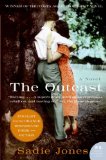Summary | Excerpt | Reading Guide | Reviews | Beyond the book | Read-Alikes | Genres & Themes | Author Bio

The Outcast is the story of Lewis Aldridge, a
troubled nineteen-year-old just returning to his family
after a two-year stint in prison. Much of the book relates
the series of events that eventually lead to Lewis's arrest,
with the last third relating the aftermath of his
homecoming.
The novel's framework is the 1950s middle-class stereotype
which both American and UK readers will find familiar. The
husband goes off to work every day; the wife's chief
responsibilities are to look good and meet her spouse at the
door with a drink and a smile when he returns. There are
parties in the garden, tennis matches on the lawn, and
everyone goes to church on Sunday. Jones deftly describes
these clichéd scenes, but always with an eye toward exposing
the hypocrisy that lies just below the surface. Conventional
events become unconventional, gradually fading from light
into darkness and violence. Because the reader is so
familiar with the stereotype, they have an expectation of
how the scene should play out. One of Jones's talents is
taking that expectation and completely shattering it.
It's difficult to read this book from a modern viewpoint, as
so much of what takes place in it would be unacceptable by
today's standards. Knowing the escalating crises portrayed
in the novel would likely be avoided (or at least
ameliorated) today makes the reader almost painfully
uncomfortable as one error in judgment leads to the next. It
very nearly becomes overwhelming. The reader empathizes so
completely with the main characters that there is a
temptation to abandon the book, rather than see the
situation deteriorate still further.
While much of the plot is banal, much of the writing is
extraordinary. Overall, The Outcast is a promising
debut novel. Jones's style is spare, yet detailed. Writing
from an omniscient viewpoint, the author narrates the
various characters' thought processes with incredible
authenticity. One of the resonances is her portrayal of
internal "conversations" the various characters have with
themselves. They know they should do or say something to
improve the situation … but then their own issues distract
them or the moment passes, and they do nothing. Indeed,
Lewis's decline is due as much to inaction as to action.
Many of Jones's characterizations are one-dimensional.
Almost all the adults are cardboard representations of some
character type: the distant father, the alcoholic mother,
the bully, the abused wife. There are no surprises here;
each acts as one would expect. The exception is the insight
and depth with which Jones draws her protagonist, Lewis. Her
development of this character is nothing short of brilliant.
She manages to capture all the uncertainty and conflicting
emotions inherent in teenagers in general, along with
Lewis's particular anguish -- yet she does so without over
sentimentalizing. She explains the impetus for his bad
behavior, but does not justify it. Lewis is in pain, he's
confused, but he doesn't come across as a victim. It's a
fine balance, one that Jones achieves perfectly.
About the Author
Sadie Jones was born in London, England, the daughter of
a poet and an actress. Her father, Evan Jones, was born in
Portland, Jamaica in 1927. He grew up on a banana farm,
eventually moving to the United States, and from there to
England in the 1950s. His most widely acclaimed work is "The
Song of the Banana Man". Sadie's mother, Joanna Jones,
was featured as an extra in various television series,
including The Avengers.
As a young woman, Sadie opted out of attending university,
preferring instead to work an assortment of odd jobs (video
production, temping, waiting tables) and to travel. After
visiting America, the Caribbean and Mexico, Sadie settled in
Paris, where she taught English and wrote her first
screenplay. She eventually moved to London, where she
currently resides with her husband, architect Tim Boyd, and
their two children.
Sadie wrote screenplays for fourteen years before producing
The Outcast, her first novel. Her writing credits
are an eclectic mix, everything from episodes of BBC-TV
shows to a feature film in 2004.
![]() This review was originally published in The BookBrowse Review in April 2008, and has been updated for the
April 2009 edition.
Click here to go to this issue.
This review was originally published in The BookBrowse Review in April 2008, and has been updated for the
April 2009 edition.
Click here to go to this issue.

If you liked The Outcast, try these:

by Niall Williams
Published 2021
A profound and enchanting new novel from Booker Prize-longlisted author Niall Williams about the loves of our lives and the joys of reminiscing.

by William Trevor
Published 2010
In his characteristically masterly way, Trevor evokes the passions and frustrations of the people of a small Irish town during one long summer.
Your guide toexceptional books
BookBrowse seeks out and recommends the best in contemporary fiction and nonfiction—books that not only engage and entertain but also deepen our understanding of ourselves and the world around us.